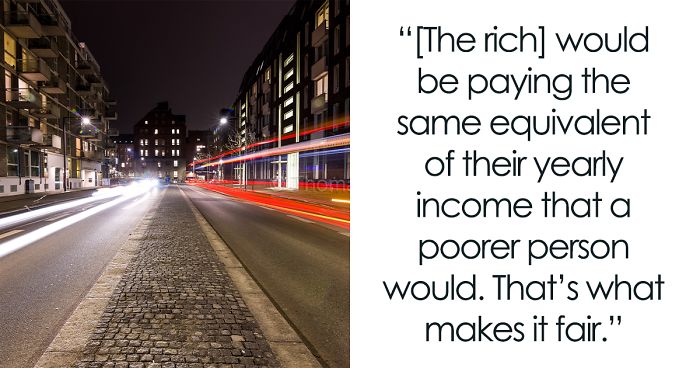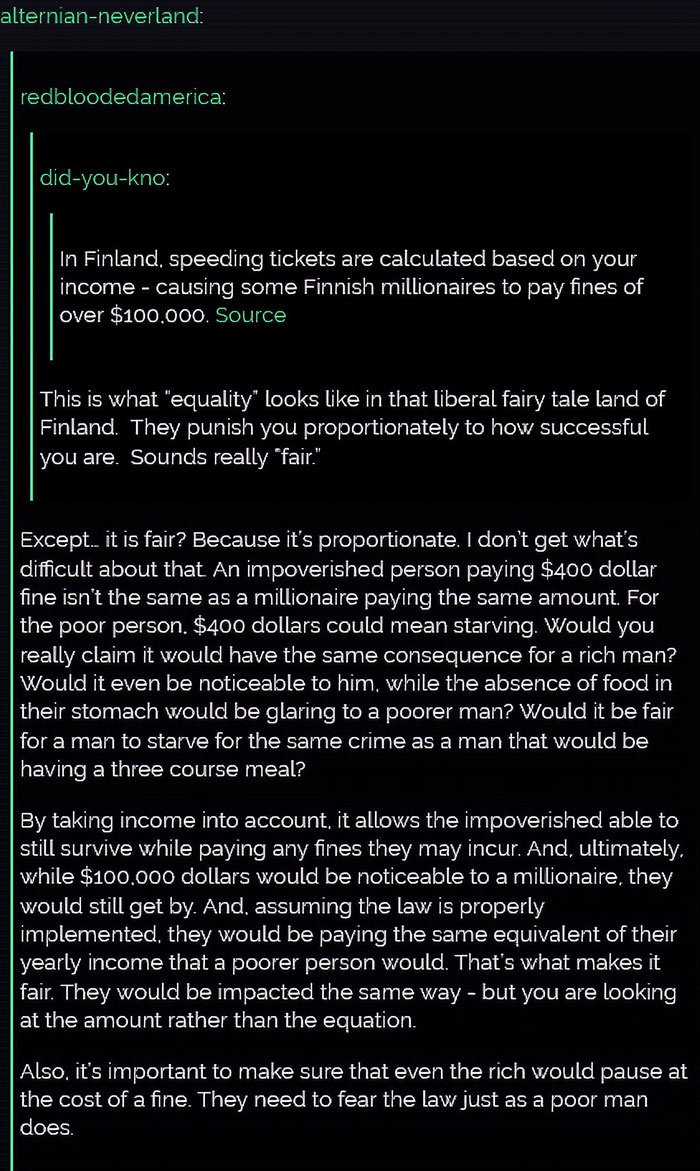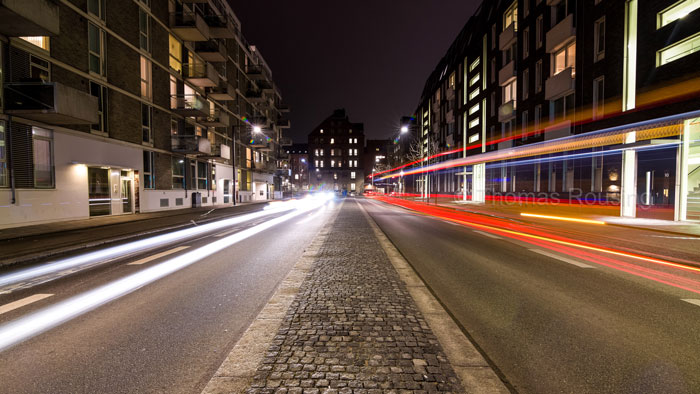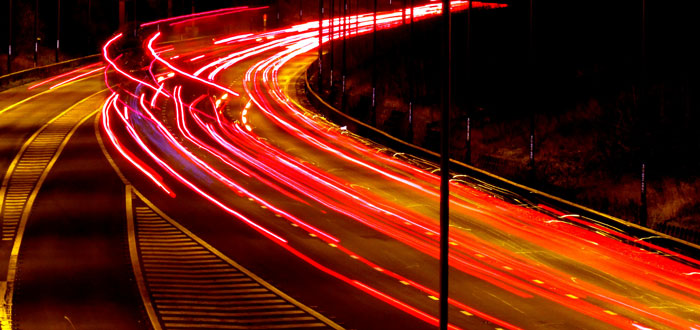
Finland Has 100k Speeding Fines For Millionaires, While People Question If It’s Fair, Tumblr User Points Out How Fair It Is
Speeding is a universal problem. Yeah, I get it, everyone has things to do and places to be. But, the amount of time people save by driving over the limit never outweighs the potential risk that it poses.
I often find myself seeing drivers whizzing past me only to be stopped at the next red light alongside me. And even if they manage to get to their destination earlier, it is never a case of them shaving off 10 minutes from their drive. More like 30 seconds. All the while, every single mile per hour exponentially increases the chances of getting into an accident. So, saving a handful of seconds isn’t worth the lives at stake.
Finland has a law that fines speeding drivers to an amount that is proportionate to their income
Image credits: Giannis Arvanitakis
Finland has come up with an ingenious way of fighting speeding drivers. They have enacted a law that determines one’s speeding fine based on the offender’s salary. This “day fine” system determines their financial punishment by calculating how much disposable income they have in the day. The standard is half of one’s daily salary. So, in other words, the more you earn, the higher the fine will be.
Sounds like an effective measure that proposes a weighted method of calculation. But wait—there’s more. There is another factor in play here, which is the severity of the offense. The fine may become gradually higher depending on how much the offender exceeds the speed limit. This means that a person who exceeds the speed limit by 10mph would get a smaller fine than someone who drives 20mph more.
This idea gave rise to a rather short-lived—but still very meaningful regardless—debate among internauts. Tumblr user alternian-neverland put the progressive speeding fine system perfectly into perspective:
Tumblr user stops all “fair/unfair” debates by providing a spot-on explanation of how just it really is
Image credits: alternian-neverland via Tumblr
He argued that making it proportionate and weighted is exactly what gives the impact. A person with 10 dollars loses 5—that is half of his wealth. A person with 100 dollars loses 5—that is just a twentieth. One will be affected much more than the other. By leveling the playing field and making so that everyone loses half (or any other meaningful amount) is what ultimately makes a difference in the face of the law.
The ultimate aim of these fines is safety. The World Health Organization has reported that around 1.35 million people die in road traffic accidents. Driving within the boundaries of the speed limit could have a significant impact on this number, as, according to the WHO, the risk of death for pedestrians hit by car fronts rises rapidly—a staggering 4.5 times from 30mph to 40 mph.
Image credits: Thomas Rousing
This has, of course, lead to some of history’s biggest speeding fines. Back in 2002, former Nokia director Anssi Vanjoki was caught driving 47mph in a 30mph zone on his motorbike and was fined $103,600. More recently, in 2015, Reima Kuisla, a Finnish businessman, had to pay $62,000 for driving 15mph above the 30mph speed limit.
Yep, you’ve already guessed where this is going. Guinness World Records claim that the largest speeding ticket belongs to a Swiss man who was caught driving 85mph in a 50mph zone in St. Gallen, Switzerland. He was fined for $290,000 US Dollars. The man was driving a Ferrari Testarossa, and the fine was based on his 22.7 million dollar wealth. The fine was made higher as he was a repeat offender.
Over 1.3M people die in traffic accidents—a huge problem which progressive fines are attempting to fix
Image credits: Kevin Galens
Oh, and before you go thinking that you have beat the system by saying “I don’t have a job, hence no salary”, things like social benefits are also included into the equation. Moreover, there is a set minimum fine if your income is below the threshold from which the fine is scaled.
Finland isn’t the only country to enact such a system for speeders. Apart from the aforementioned record broken in Switzerland, the UK also has a similar system in place. However, UK’s punishments for speeding are capped at £2,500, practically canceling out the entire progressive system. Other countries that fine on a “day-fine” basis are Estonia, Sweden, Germany, Denmark, France, and Macao.
Image credits: Ozzy Delaney
However, having a progressive taxation and fine system doesn’t necessarily mean that it is the best and only way to avoid deaths on the road. Some countries, like Sweden, moved to also establish stricter laws for drivers, imposing higher standards, and also improving their infrastructure. As pedestrians and cyclists are some of the biggest victims on the road, the country began building more roundabouts and pedestrian-only bridges.
So, the next time you’re driving, keep in mind that you can never know what might happen on the road. Speed limits are there for a reason, even if you might not know it. Drive safely and responsibly. Oh, and don’t forget to wear a seatbelt!
Fine is supposed to deter people from doing wrong things again, something that they shouldn't have done in the first place, like speeding. If a fine is negligible to some people, they wouldn't be bothered. So this sounds fair to me
I think you're spot on. Treating everyone the same way and being fair are not the same thing.
Load More Replies...Every fine should be like this, in every country. Make it proportional to the person's income, and more rich people would think twice about breaking the law. I've heard that some rich people think of fines as 'it costs $X to do X thing'. Thus reinforcing the idea that they are above others, and can use their money to do whatever they please. Give them a fine that stings their pocketbook, and then it becomes an actual deterrent; While, at the same time, not disproportionately punishing the poor.
There is a guy in my city who owns the only McLaren with that county tag on that color vehicle. I have probably 60+ dash cam recordings of this one jackass weaving in and out of a tolling lane around each car so he can push 100+ mph in midmorning traffic. It's a $25/per double line cross and he probably crosses it dozens of times each morning on his way in town. I've been nearly killed by this guy more times than I can count. The fines literally mean nothing to him. And, Leodavinci, most of the vehicles I see speeding are luxury vehicles that are upper middle to upper class cars. Not a dude in a Civic with a taillight out.
Load More Replies...Finland also has different speed limit winter and summer. Lower limits in winter saves a lot of lifes !
Fine is supposed to deter people from doing wrong things again, something that they shouldn't have done in the first place, like speeding. If a fine is negligible to some people, they wouldn't be bothered. So this sounds fair to me
I think you're spot on. Treating everyone the same way and being fair are not the same thing.
Load More Replies...Every fine should be like this, in every country. Make it proportional to the person's income, and more rich people would think twice about breaking the law. I've heard that some rich people think of fines as 'it costs $X to do X thing'. Thus reinforcing the idea that they are above others, and can use their money to do whatever they please. Give them a fine that stings their pocketbook, and then it becomes an actual deterrent; While, at the same time, not disproportionately punishing the poor.
There is a guy in my city who owns the only McLaren with that county tag on that color vehicle. I have probably 60+ dash cam recordings of this one jackass weaving in and out of a tolling lane around each car so he can push 100+ mph in midmorning traffic. It's a $25/per double line cross and he probably crosses it dozens of times each morning on his way in town. I've been nearly killed by this guy more times than I can count. The fines literally mean nothing to him. And, Leodavinci, most of the vehicles I see speeding are luxury vehicles that are upper middle to upper class cars. Not a dude in a Civic with a taillight out.
Load More Replies...Finland also has different speed limit winter and summer. Lower limits in winter saves a lot of lifes !


















186
56